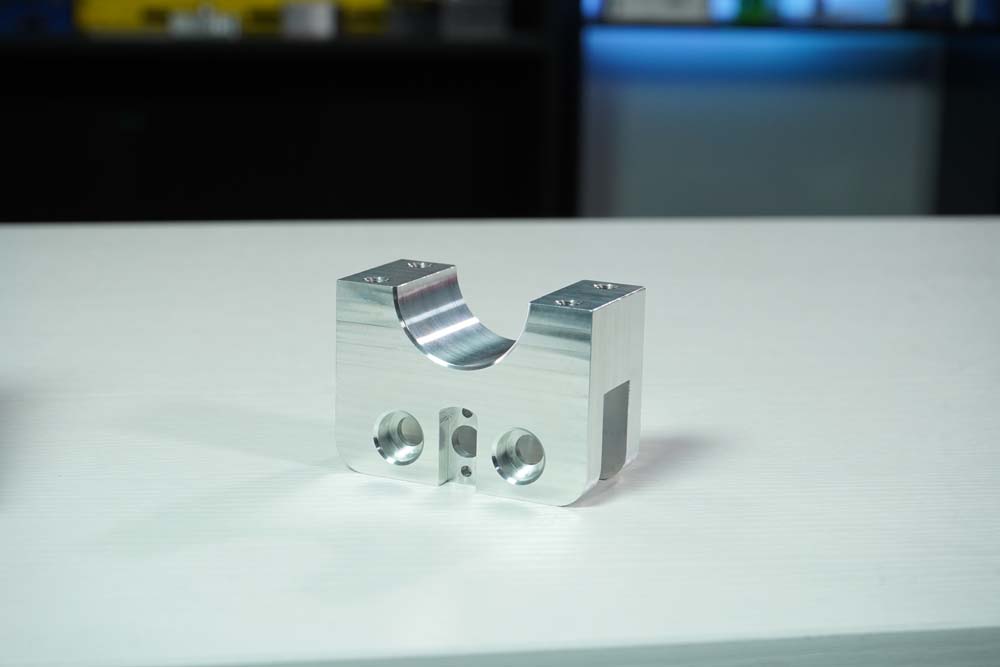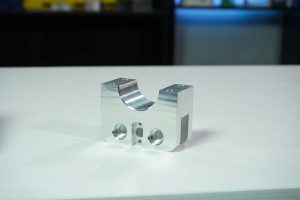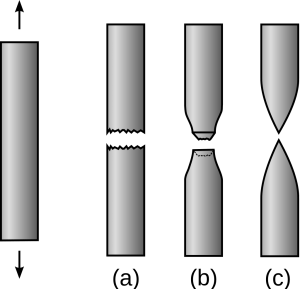
Product parameters
- Material: Aluminum 6061
- Size: None
- Process: CNC turning
- Surface treatment: None
Why Use Aluminum for CNC Machining Retainer Bracket?
Lightweight: Aluminum and its alloys have a low density, about one-third that of steel. This makes aluminum retainer brackets ideal for applications where weight reduction is crucial, such as in aerospace, automotive, and electronic devices.
Strength and Durability: Modern aluminum alloys, after heat treatment and cold working, offer good strength and toughness, making them suitable for most structural applications.
Corrosion Resistance: Aluminum and aluminum alloys form a thin, dense oxide layer on their surface, which effectively prevents further oxidation. This provides excellent corrosion resistance, making aluminum suitable for use in humid and chemically aggressive environments.
Machinability: Aluminum alloys have excellent machinability, making them easy to process through cutting, stamping, extrusion, and forming. This allows aluminum alloy products to meet the demands of complex designs and precision manufacturing.
Thermal and Electrical Conductivity: Aluminum alloys have excellent thermal and electrical conductivity, which is important for applications requiring efficient heat dissipation or electrical current transmission.
Recyclability: Aluminum is a highly recyclable metal, and recycling aluminum consumes only about 5% of the energy required for primary aluminum production. This makes the use of aluminum alloys more environmentally friendly and economical.
Application of Retainer Bracket
Automotive Industry: In vehicles, retainer brackets are used to secure and support various components such as engines, transmissions, exhaust systems, and body panels. They help in reducing weight, which improves fuel efficiency and vehicle performance.
Aerospace Industry: Retainer brackets in aerospace applications are used to hold and support critical components such as avionics, landing gear, control surfaces, and structural elements. The lightweight nature of aluminum is crucial in this industry to maximize fuel efficiency and payload capacity.
Electronics and Electrical Industry: In electronics, retainer brackets are used to mount and secure circuit boards, heat sinks, and other electronic components within devices such as computers, smartphones, and servers. The good thermal conductivity of aluminum helps in effective heat dissipation.
Construction Industry: Aluminum retainer brackets are used in building and construction to hold structural elements, facades, and panels. They offer the benefits of corrosion resistance and ease of installation, making them suitable for both indoor and outdoor applications.
Marine Industry: In marine environments, retainer brackets are used to secure various equipment and structural components on boats and ships. The corrosion resistance of aluminum makes it ideal for use in harsh, salty conditions.
Renewable Energy: In renewable energy systems, such as solar panels and wind turbines, retainer brackets are used to mount and secure panels and other components. Aluminum’s lightweight and corrosion-resistant properties are advantageous in these applications.
Medical Devices: In the medical field, aluminum retainer brackets are used in various medical equipment and devices, providing secure mounting and support while maintaining a lightweight structure, which is important for portable and ergonomic designs.
Industrial Equipment: Retainer brackets are used in various industrial machinery and equipment to hold and support parts, including conveyors, robotic arms, and production line components. The durability and strength of aluminum alloys ensure reliable performance in demanding industrial environments.
CNC machining accuracy and delivery time
CNC Machining Accuracy
CNC machining can achieve very high precision and tight tolerances, typically within the range of ±0.001 inches (±0.025 mm) for standard machining processes. For more precise operations, tolerances can be as tight as ±0.0002 inches (±0.005 mm).
CNC Machining Delivery Time
According to the processing difficulty of customer products.



